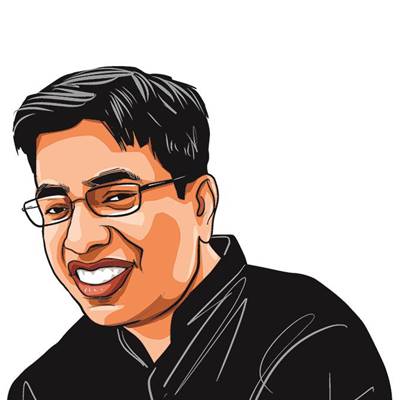Opinion From the Opinions Editor: Assembly election results and the big question for 2024
Can the Opposition regroup and articulate a criticism of the government that sticks?
 TMC leader Mahua Moitra with Congress MPs Sonia Gandhi and Rahul Gandhi and other opposition leaders. (PTI Photo)
TMC leader Mahua Moitra with Congress MPs Sonia Gandhi and Rahul Gandhi and other opposition leaders. (PTI Photo) There is enough evidence to show that voter behaviour during state elections is not always similar to the choices people make in general elections. However, with the Lok Sabha polls barely a few months ago, it was perhaps inevitable that the recently declared assembly election results would prompt conversations on the direction of the electoral winds in 2024. The BJP’s emphatic victories in Rajasthan, Madhya Pradesh and Chhattisgarh have led to a search for patterns in the country’s polity post-2024.
The Congress now heads governments in only three states. A consolation victory in Telangana notwithstanding, questions are being raised about its ability to lead the opposition bloc. A related question pertains to the viability of the Opposition itself. Is 2024 a foregone conclusion? In a debate in this newspaper, two experts had divergent views. Psephologist Pradeep Gupta contended that India, is in the throes of a “pro-incumbency wave, unprecedented in the country’s history”. “The BJP’s phenomenal victory in Madhya Pradesh, Rajasthan and Chhattisgarh as well as the surge in Telangana has once again demonstrated the unparalleled connect Prime Minister Modi has with the people of the nation — a bond which transcends geographies, caste, creed, community, language and gender” he wrote.
Scholar and activist Yogendra Yadav disagreed. The results have only “created favourable optics” for the ruling party, he argued. “Except in MP, the margin of the BJP’s victory is very small in terms of popular votes. Congress’s lead over the BJP in Telangana is large enough to make up for its deficit in the rest. So the BJP has not received a massive popular endorsement in the latest round,” he underlined.
What will it take for the Opposition to dent the BJP? This newspaper’s columnist Pratap Bhanu Mehta believes that the Opposition is still not able “to articulate a criticism of the government that sticks”. He agrees that the Congress’s vote share has remained constant but emphasises that the Grand Old Party is at its best only when “speaking to the converted”. “The Opposition keeps falling into arguing on Hindutva’s terms. The core concern of the Opposition is not a dog fight over culture, the Congress ecosystem is not well place to win that fight,” he contended.
Mehta also took on the notion of a North-South binary in India’s politics that has found resonance after the Congress’s victory in Telangana and the party’s contrasting performance in Rajasthan, Madhya Pradesh and Chhattisgarh. “The intellectual scaffolding that Congress’s supporters are trying build around them is counterproductive, bordering on the racist…It belies the fact that there is simmering communalism in the south, even in Kerala,” he wrote.
Ashutosh Varshney agreed that the “South is not BJP-mukt”. But he contends that the party cannot find a “historical charge” to provoke antagonism against Muslims like in the North and Hindu nationalism falls flat. “Since the South is more developed than the North and has had a history of welfare politics for the subaltern, the narrative of roads and cooking gas does not excite popular enthusiasm,” he wrote.
The good governance quest is, of course, a heartening constant in Indian polity. That was aptly illustrated by the Mizoram voters putting their weight beyond the Zoram People’s Movement (ZPM), ending the duopoly of the MNF and the Congress. As Sanjoy Hazarika wrote, “The ZPM had announced its candidates and economic agenda well ahead of the polls giving its candidates time to familiarise themselves with their constituencies and vice-versa. It rejected the cash incentives, saying that it had led to extensive corruption. A significant point that counted with farmers was the ZPM declaration that it would fix minimum support prices for four key cash crops – turmeric, ginger, chilli and broomstick plants”.
The developmental imperative, however, requires constant redrawing of plans and being alert to changes on diverse fronts. In recent years, ecological concerns have increasingly demanded a say in plans for cities, towns and villages. But our planners have not always faced up to this challenge adequately. The deluge triggered in Chennai by Cyclone Michaung has rightly precipitated conversations on making urban centres climate proof. As this paper’s editorial on December 8 pointed out, “In recent years, the city, like several parts of the country, has been experiencing short duration spells of intense rainfall. That’s the biggest challenge for the country’s planners”.
Challenges on the developmental and governance fronts are likely to intersect sharply with political, social and cultural narratives in the next few months. The countdown for 2024 seems to have begun. We will strive to place before you the expressions of this interesting period in all their diversity.
Stay well,
Kaushik Das Gupta
Must Read Opinions from the Week:
– The BJP’s sweep: Modi is the mascot, party is the culture
– Why BJP defied predictions to win Madhya Pradesh: Shivraj Singh Chouhan’s agricultural revolution
– Why is India covered in a haze one year and not the other? Delegates at COP28 have to join the dots
– Man in a man’s world: ‘Animal’ is not just banal. Its provocations are tepid and boring



